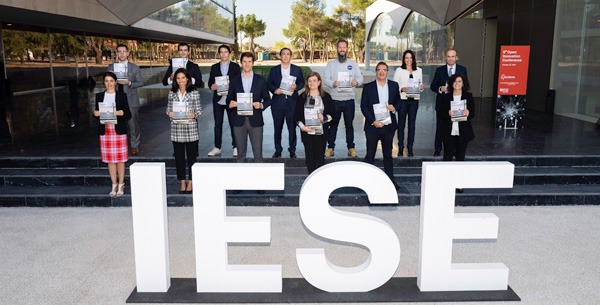New study released at the 9th Open Innovation Conference co-organized by IESE Business School, Acciona and Cardumen Capital in Madrid
- 95 global innovation leaders take part in new report presented at an event co-organized by IESE Business School, Acciona and Cardumen Capital
- The new study, including 100+ examples, sheds light on how corporations can better innovate with startups via enablers such as VC investors, research centers, private accelerators, and more
- The 9th Open Innovation Conference, hosted at IESE in Madrid, brings together chief innovation officers, corporate investors, and innovation leaders from Airbus, Santander Bank, BBVA, Acciona, Cardumen Capital, Telefonica, Decathlon, Mutua Madrileña, among others
Madrid, October 28 2021. Authored by IESE Business School, in collaboration with Acciona and Cardumen Capital, a new report is released today about corporate venturing – the collaboration between established companies and startups, a phenomenon globally growing at speed.
As it opens the doors on innovation, it’s bringing more players in. In corporate venturing, “enabler” institutions, such as universities and venture capital firms, are increasingly key: they help established companies join forces with startups and benefit in return, offering distinct advantages from independent knowledge to opportunity deal-flow, cost de-risking, and network effects.
Authored by IESE’s Josemaria Siota and Ma Julia Prats, in collaboration with Vittoria Emanuela Bria, Acciona’s Telmo Perez and Cardumen Capital’s Gonzalo Martínez de Azagra, the study aims to shed light on how to unlock hidden opportunities for corporations by knowing their roles, which types could be most valuable to different firms, and how to craft a compelling value proposition for the two institutions.
As corporate venturing turns to institutional enablers, six categories have become apparent:
- Knowledge institutions, including research centers, university departments and think tanks.
- Boosting institutions. Namely, private incubators and accelerators that support entrepreneurs by providing space, technology infrastructure and other types of assistance.
- Investment institutions that fund startups, including business angels, venture capitalists (VC) and private equity firms.
- Public institutions, including government branches and embassies.
- Business institutions, including other large corporations, even competitors, as well as chambers of commerce.
- Service institutions — i.e., consultancy firms offering specialized innovation support.
Based on 95 interviews with innovation leaders in companies across four continents, the report identifies the most salient benefits of enablers in their view. Topping the list is “independent knowledge” (in 32% of the cases) because of the rapid evolution of trends such as venture clients as a service, fund-of-funds and excubators, combined with the complexity involved in understanding deep tech startups. Next in line is “opportunity deal flow” (in 26% of the cases), an area which is increasingly critical as scouting suppliers have proliferated and identifying opportunities before competitors do is becoming more challenging.
The report also finds that enabling institutions benefit in return from their interactions with corporations. Interviewees highlighted companies’ “domain expertise” (in 29% of cases) and their “business applicability” knowledge (in 17% of cases) as some of the main benefits. Lastly, it showcases the relevant of corporations working together to innovate with startups, also called corporate venturing squads.
The report is being released as part of IESE’s 9th Open Innovation Conference, held on October 27 at the new building of IESE’s Madrid campus. The conference brings together chief innovation officers, corporate investors, and innovation leaders from companies such as Airbus, Santander Bank, BBVA, Acciona, Cardumen Capital, Telefonica, Decathlon, Mutua Madrileña and Business Insider.
The gathering counted on the support of the dissemination partners Amazon Web Services for Startups, Endeavor, Madrid Innovation Driven Ecosystem, Embassy of Spain in Tel Aviv, Impact Hub, Madrid City Council, ICEX, Chamber of Commerce of Madrid, The Collider, Global Shapers, and ASCRI.
Access the agenda of the conference.



